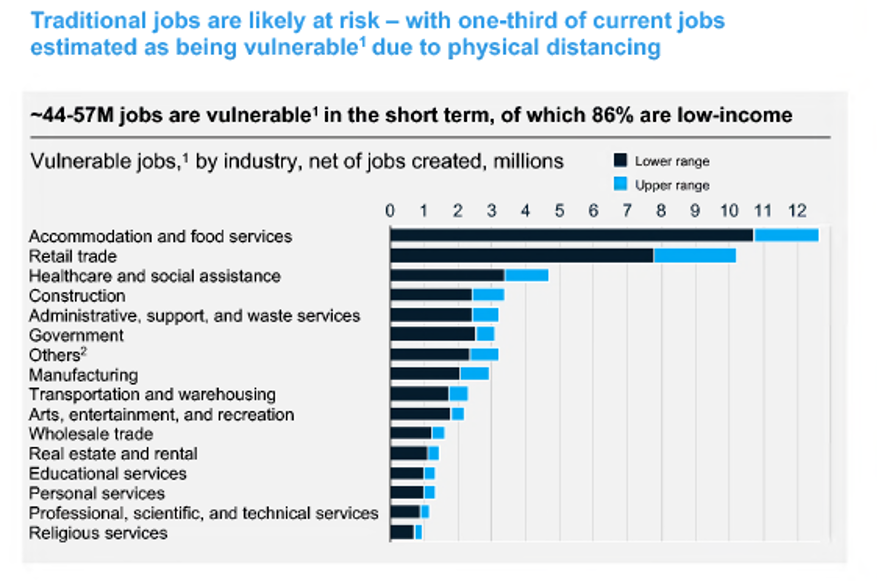This study, prepared by experts from McKinsey & Company, reflects possible options for the epidemiological situation associated with the spread of the COVID-19 pandemic, as well as key changes in the economies of countries affected by coronavirus, which determine the main factors of the current situation in which businesses need to plan their recovery. In addition, the authors of the study highlight the features of recovery of specific industries, as well as formulate key recommendations necessary for a successful restart of the company.
In the previous version of the study «COVID-19: Information Materials» experts of McKinsey & Company presented the main trends of the situation against the background of coronavirus pandemic, as well as the response to the crisis in different countries and in different companies, as of April 3, 2020.
Roscongress Foundation analysts highlighted the main theses of this research, accompanying each of them with suitable fragments of video broadcasts of panel discussions held as part of business programs of the key events hosted by the Foundation.
Despite the different scenarios of COVID-19 spread over the next two years, varying from country to country, there is a general trend towards the beginning of recovery of companies whose nature is related to outdoor activities and crowded areas, as well as manufacturing plants and small retail stores.
The spread of the COVID-19 pandemic to different regions of the world includes four stages, namely, the emergence of local sites of infection, uncontrolled acceleration, slowdown in spread, and control over the number of new cases. At the same time, the restart of various industries and their respective companies is characterised by the third and fourth stages.
In the conditions of the new reality, characterised by increased security requirements, the sectors of economy and aspects of public life of these countries are characterised by different level of readiness to resume business activity. Thus, the highest level of readiness to work in the post-crisis conditions of the countries under consideration is demonstrated by the companies, the nature of whose activity is associated with activity on open sites, as well as manufacturing enterprises and small retail stores. Companies located in business centers and office buildings, as well as the international tourism industry, are the least ready to resume their activities, while in respect of domestic tourism there are more positive trends for recovery.
Changes in consumer behavior, remote work and localisation of production are the main characteristics of the new reality.
The new reality emerging from the Coronavirus pandemic is affecting changes in several key economic and social aspects. Thus, a significant reorientation of consumers to make purchases through online mechanisms indicates a metamorphosis of consumer demand.
Remote work mode is also one of the key changes today. More and more people express their wish to continue their work in the remote mode after the emergency 87% of the interrogated stated this against 37% who expressed their position before the pandemic.
At the same time, specialists claim that a significant part of employees are experiencing difficulties in the current conditions. The main areas of risk include, first of all, catering and accommodation, retail trade, as well as health care and social assistance.
Unprecedented level of government support and the growing trend towards increased localisation of economies are also one of the determining factors of the current situation. Thus, the G20 countries have tripled the amount of stimulus packages compared to the same amount of measures taken in the framework of combating the consequences of the World Financial Crisis of 2008.

In order to successfully resume its activities, the business needs to ensure the appropriate level of promptness of decisions and take into account the peculiarities of modern realities.
The current crisis requires companies and organisations to make prompt decisions on a number of key issues related to the functioning of their organisations. Thus, the respective managers have to solve urgent tasks related to the internal environment (first of all, employees), as well as a number of external contour issues related to clients and business partners. Next, leaders also need to take appropriate measures to ensure a relatively stable state of their companies (primarily in the management of financial and other flows, taking into account the consequences of blockages).
Achievement of the relative sustainability of the organisation should be accompanied by a return of business to a scale comparable to the pre-crisis level of development. At the same time, this phase requires taking into account new realities, primarily related to the changed conditions of interaction and security standards, which should also be reflected in the revised strategy of the organisation.
We also invite you to see other materials posted in special sections of the Roscongress Information and Analytical System Entrepreneurship, StayHomeEkonomy and Pandemics, dedicated to possible ways to counteract epidemics, one of the most serious threats of non-economic nature, ways to stabilise the economy in a complex epidemiological situation, as well as measures to develop entrepreneurship.






